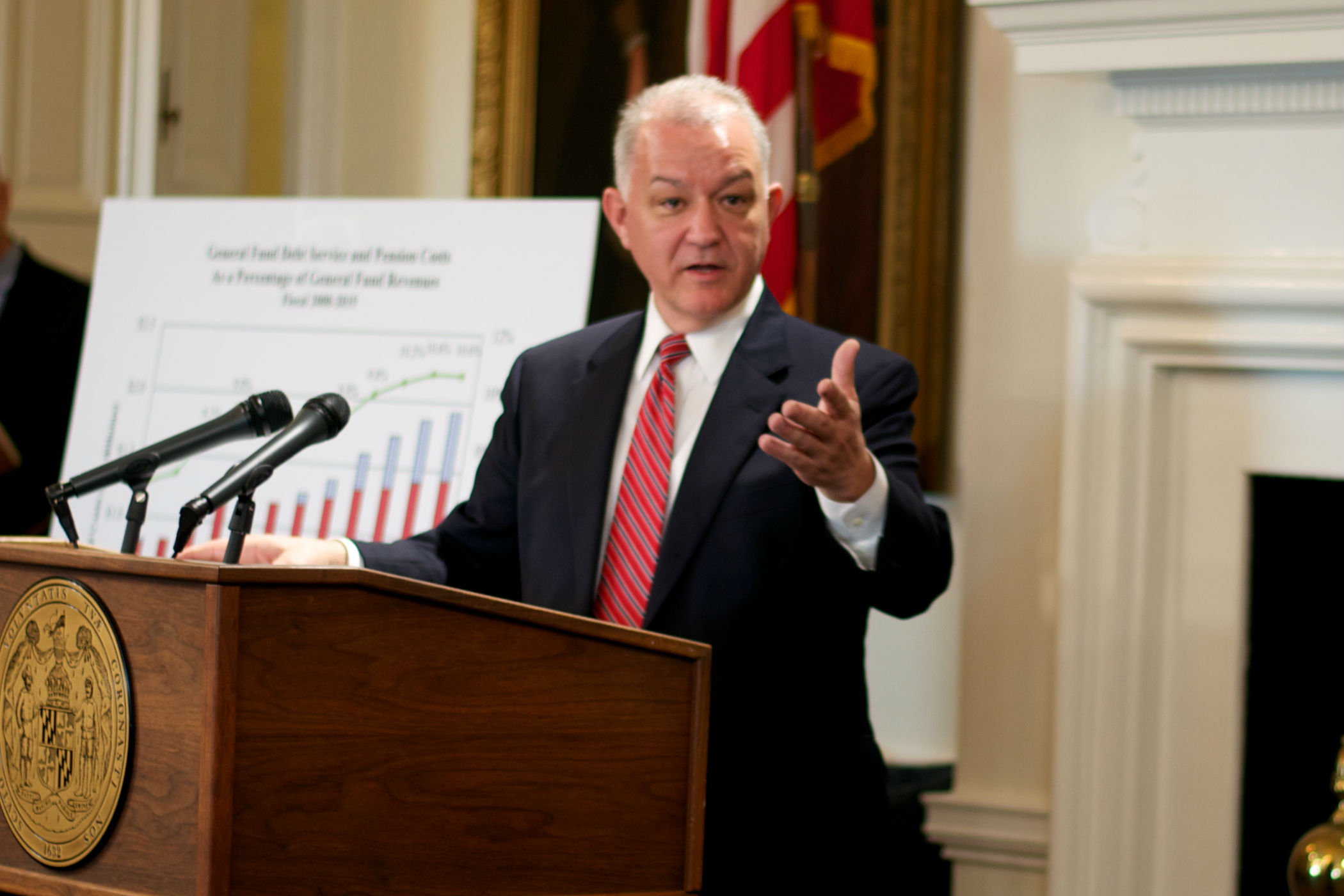Photo above: Budget Secretary David Brinkley (Photo by Rebecca Lessner for MarylandReporter.com)
By Len Lazarick
Delegates grilled Budget Secretary David Brinkley on Tuesday, asking him to justify Gov. Larry Hogan’s plans to limit growth in school funding and curtail employee pay raises as they took up legislation that implements those decisions.
Brinkley, a former senator, said the governor wants to “structurally balance the budget permanently.”
Why do it all in the first year? asked Del. Terri Hill, D-Howard, rather than over two or three years.
“The administration believes it can be done in one year,” Brinkley told the House Appropriations Committee and members of other committees in a hearing on the Budget Reconciliation and Financing Act.
Controlling budget growth
“Our mission is to try to flatten the growth of the budget,” Brinkley said. Under current law, “The budget is going up at 5% and revenues are going up at 3.5%.”
“All we’re trying to do is take a pause, take a breath,” he said. “Our mission is trying to get things under control. We feel it can be done in one year.”
Del Jay Walker, D-Prince George’s County, wanted to know why the administration had decided “to take the drastic steps that you’ve taken” in reducing expected growth in school aid.
“The formulas call for $17 billion in spending but we only have $16.3 billion coming in,” Brinkley explained. “The formulas are out of whack.”
Walker and other legislators describe Hogan’s school funding plans as “cuts” even though more than half the counties get slightly more money. Because of enrollment growth, Prince George’s, Montgomery and other counties are getting less money per pupil.
Asked about the failure to give state employees a promised 2% pay raise, Brinkley said, “We don’t like it” but it was necessary.
Gov. Hogan said last month he would also have liked to give state employees pay raises and provide more education funding, but the state couldn’t afford it.
Pension board unhappy with proposal
In an effort to find more money for schools and state employees, legislative staff is proposing a long-term reduction in payments into the pension system.
The trustees of the state pension system and its actuary are not happy about the move. They held a special meeting Tuesday morning to discuss the plan, but took no official position other than reiterating their opposition to similar cuts in supplemental payments in last year’s budget.
By switching payment methods, the state would save $60 million this year and $2 billion over the next 10 years. But in the following 13 years, it will cost the state $4.5 billion more for a net cost of $2.5 billion.
On the conference call, actuary Brian Murphy of GRS said, “the contributions really are needed.
“The retirement system is better off getting the money sooner rather than later,” Murphy said. “It will cause us some grief” and the current funding method “should stay in effect until there’s some reason to change it.”
The reduction in pension payments are partially based on double-digit investment returns the past two years. Trustees worry that poor investment returns in some years could jeopardize the pension funding if payments are cut.




I’m always amused by our august legislators. They’ve raised tax after tax telling us after each increase that we’ve staved off another budget “crisis”. One wonders just how do these people balance their personal budgets? Do they constantly run deficits, spending more than they make & borrow $ to make up the shortfall? Or do they, like most people, compare income vs expenses & make adjustments when necessary. That’s the way things work in the “real” world. Living within one’s means is not only demonstrating fiscal responsibility but insures that the next generation of Maryland taxpayers will not be saddled with paying off the free spending bills of their predecessors.
Let’s not play around with the pension system. One wonders about legislators re-jiggering the system just to give employees a FY 2016 payraise and to cover the growth in school aid (not a cut, but a cut in growth). Pensions are promises; payraises and cuts in growth in education are not. Also those left holding the bag (the taxpayers) will be shelling out over $2 billion when the current legislators are long gone.
Brinkley sounds quite the diplomat, probably a sound tactic with these big-government inquisitors.